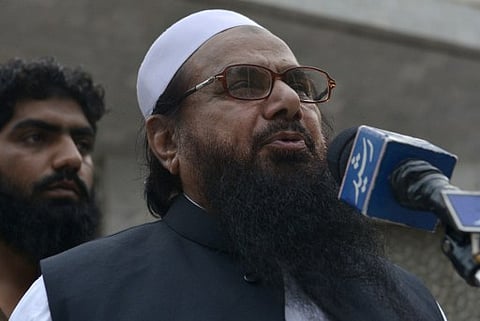

LAHORE: Pakistan's Punjab government has dismissed the plea of Jamaat-ud-Dawah chief Hafiz Saeed to end his detention fearing that it may create a law and order situation in the province, the Lahore High Court was informed today.
The Home Department of Punjab today submitted a two-page reply to the LHC, informing the court of its decision.
Citing different illegal acts of his organisations - JuD and Falah-i-Insaniat - the department said: "The act on the part of Hafiz Saeed reaffirms the apprehension of the law enforcement and intelligence agencies that if he is released his activities will create law and order situation."
It has been recommended to keep the detenue (Saeed) under detention "in larger public interest".
The department further said that the activities of Saeed will "pose grave threat to the public safety and cause the breach of public order."
It said that after hearing the counsel for Saeed and representatives of the Counter Terrorism Department, Special Branch, Lahore police chief, DIG Operations and Security Branch, Home Secretary MaJ (R) Azam Suleman "finds no merits in the representation of Saeed hence it is rejected".
LHC Justice Mazahir Ali Naqvi adjourned the hearing till September 15.
Mumbai attack mastermind Saeed and his four aides - Abdullah Ubaid, Malik Zafar Iqbal, Abdul Rehman Abid and Qazi Kashif Hussain - had challenged the extension of their house arrest for another 60 days under section 1 of section 3 of Maintenance of Public Order, 1960.
Saeed had filed a fresh petition a couple of weeks ago after getting frustrated for not getting a decision from the LHC that had on June 7 reserved on his and four aides'
petition against their first detention order issued on January 30.
Saeed's counsel advocate A K Dogar told the court that the government in its July 28 detention order has only shown apprehension against the petitioners.
"Under the law no presumption and assumption can give rise to any apprehension unless it is supported by some piece of evidence. There is no evidence whatsoever that the petitioners are planning to spread chaos in the country or that they have planned violent demonstrations," he argued.
He requested the court to set aside the detention order for being issued without lawful authority.
On June 7, a division bench headed by Justice Abdul Sami Khan had reserved the decision on Saeed and his four aides'
petitions against their detention after hearing the arguments from petitioners counsel and the government law officer.
The verdict has yet to be announced. No reason has been provided for its delay.
Saeed and four others were put under house arrest in Lahore on January 30 under the Anti-Terrorism Act 1997.
Pakistan's Interior Ministry in a written reply to the LHC has defended the detention of the JuD leaders saying that no laws were violated in an issuance of the detention orders against Saeed and his aides.
The JuD has already been declared as a foreign terrorist organisation by the United States in June 2014. The JuD chief carries a reward of USD 10 million announced by the US for his role in terror activities.